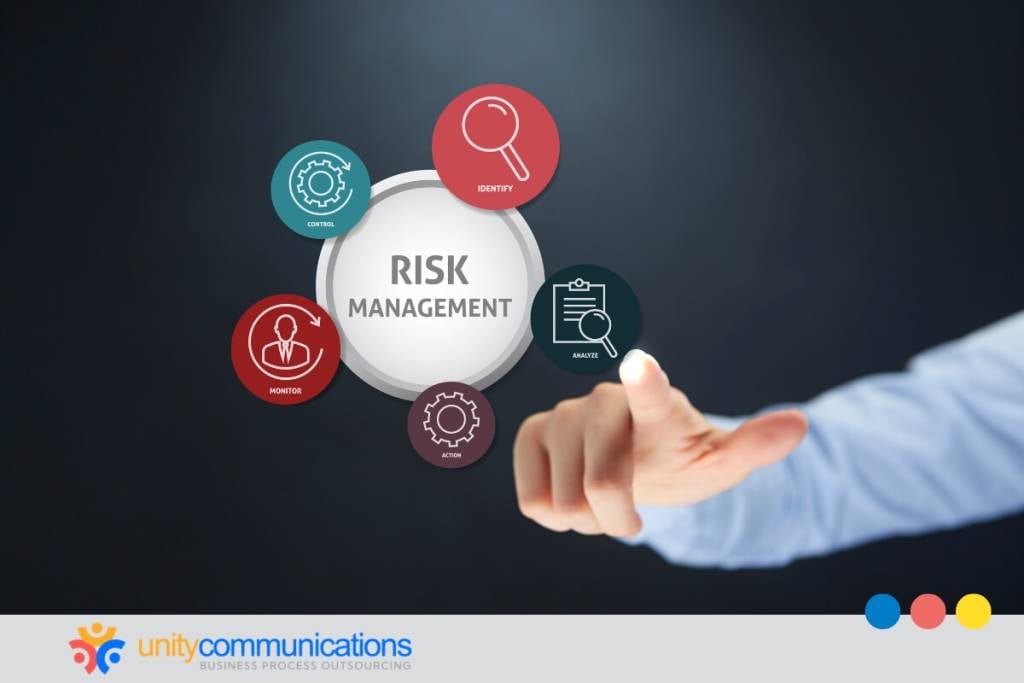Table of Contents
In Austin, Texas, minimizing the potential risks or losses associated with outsourced call center services is paramount. Austin call center outsourcing providers must employ stringent risk management protocols to guarantee optimized operations, improved customer service processes, and effective partnerships.
This article explores the benefits and risks of call center outsourcing. It highlights the critical strategies for safeguarding success in Austin’s outsourced call centers, ensuring resilience, efficiency, and excellence in service delivery.
Keep reading to learn more.
Gaining a market edge for Austin firms via call center outsourcing

Intense business competition prevails in Austin. The heart of Texas is saturated with over 38,000 small and budding enterprises. The presence of information technology (IT) giants adds to the intense and dynamic corporate landscape. Apple, Amazon, Google, Meta, IBM, Oracle, and Dell Technologies are among the well-known tech companies that call the city their home.
Survival of the fittest is the prevailing philosophy in Austin’s fierce business landscape. Only the most flexible, inventive, and competitive firms can overcome obstacles, capitalize on opportunities, and maintain long-term success in a constantly shifting market.
To survive in such a whirlwind environment, Austin companies must find a way to gain a competitive advantage. This will help them stand out from rivals, attract more customers, and corner a better market share.
Outsourcing call center functions to a third-party expert, such as a business process outsourcing (BPO) provider, is a proven approach for enterprises to become competitive or achieve a market edge. Let us delve into the advantages Austin companies can enjoy when delegating customer support operations to BPO providers.
The rewards of call center outsourcing for Austin businesses
Outsourcing customer service and support operations to BPO call center companies offers several benefits for Austin businesses. The following are some key advantages:
- Improved cost savings. Subcontracting call center operations can lead to significant business savings. In particular, nearshore and offshore BPO providers operate in regions with lower labor costs, allowing companies to reduce salaries, benefits, and overhead expenses. Outsourcing also lowers infrastructure, technology, and training costs.
- Accessible, skilled talent. BPO firms can tap into a pool of knowledgeable, trained, and experienced customer service representatives. These professionals are proficient in consumer, sales, and technical support. BPO enables firms to benefit from the expertise of qualified individuals without the need for expensive recruitment and training initiatives.
- Scalable functions. Outsourcing firms offer Austin enterprises the flexibility to adjust to evolving business needs and market volatility. They can swiftly increase staffing levels, resources, and technology infrastructure to maintain high-quality customer service during peak periods and business growth.
- Better focus on core competencies. Outsourcing non-core functions such as customer service allows Austin organizations to concentrate on their main strengths. Entrusting call center operations to BPO partners lets companies prioritize innovation and growth initiatives to build and strengthen competitiveness.
- Boosted customer experience. Transferring call center operations to a BPO organization often improves customer service experiences. Trained call center personnel are prepared to manage buyer inquiries, address issues quickly, and provide individualized service, increasing customer satisfaction and loyalty.
- Technological advancements. BPO firms invest in the latest technologies and tools to drive call center efficiency and performance and gain customer insights. These include advanced customer relationship management (CRM) and omnichannel communication systems, artificial intelligence (AI) tools, and contact as a service (CCaaS) solutions.
The risks of call center outsourcing for Austin businesses

While call center outsourcing provides various benefits, it also comes with certain risks that Austin companies must consider and mitigate. Below are some potential threats:
- Data security concerns. Outsourcing call center operations entails exchanging sensitive customer data with third-party service providers. It risks data breaches, unauthorized access, brand damage, and legal consequences due to inadequate security measures and compliance standards.
- Quality control challenges. Maintaining service quality and performance standards is challenging when outsourcing call center services. Variations in training and culture and hurdles in communication can all influence the quality of customer interactions, resulting in discontent, customer churn, and reputational harm.
- Communication issues. Effective communication is essential for seamless collaboration between Austin businesses and outsourced call centers. Differences in language competence, accents, and cultural subtleties can lead to misunderstandings, hindering smooth interaction and reducing productivity, efficiency, and service quality.
- Regulatory compliance risks. Outsourced call centers require compliance with data protection, privacy, and consumer protection regulations. Lack of adherence can result in legal implications, financial fines, and harm to a company’s image.
- Loss of control. Outsourcing call center operations entails relinquishing control over certain aspects of customer service delivery to third-party providers. This lack of oversight might make monitoring performance, responding to consumer complaints, and implementing process and procedure adjustments or enhancements challenging.
- Third-party vendor dependency. Austin businesses rely on outsourcing partners’ performance and reliability for call center operations. Interruptions, service failures, or service-level agreement (SLA) violations by BPO providers can harm operations and revenue.
- Economic and political risks. External factors, including overall business instability or policy changes, can threaten Austin firms’ call center outsourcing initiatives. Labor costs, currency rates, and regulations impact outsourcing agreements’ cost-effectiveness and feasibility.
Key strategies: Austin call center outsourcing and risk management
Austin businesses must carefully assess these potential call center outsourcing issues and implement risk management strategies to mitigate them and maximize the rewards. Consider the following recommendations:
Conduct thorough vendor selection
Comprehensively evaluating the BPO company and its services is crucial for Austin call center outsourcing. This risk management approach ensures reliability, expertise, and alignment with regulatory requirements to protect against potential disruptions and enhance operational efficiency.
Follow these tips when selecting vendors:
- Research potential BPO partners that offer outsourced technical support, customer service, and similar processes. Review their experience, reputation, and capabilities.
- Analyze their track record, industry accreditations, compliance with regulations and standards, and commitment to data security.
- Ask for references, case studies, testimonials, and site visits to gain insights into their operational processes and service delivery standards.
Define clear expectations and contracts
Austin companies must establish call center outsourcing agreements for risk management. Doing so guarantees accountability and clarifies responsibilities and dispute resolution mechanisms to alleviate legal, operational, and financial risks, enhancing the effectiveness of the partnership.
Apply these techniques when defining expectations and contracts:
- State detailed expectations, deliverables, and key performance indicators (KPIs) in the SLA contract.
- Specify data security protocols, confidentiality requirements, compliance obligations, and dispute resolution mechanisms.
- Ensure alignment between business goals and outsourcing objectives to mitigate misunderstandings and conflicts.
Establish robust data security measures
Austin companies must also set solid data security protocols as a call center outsourcing risk management strategy. This approach safeguards sensitive information and minimizes the risk of data breaches, helping to preserve business reputation and customer trust.
Employ these tactics when establishing data security measures:
- Execute solid data security procedures to protect confidential customer information from unwanted access, breaches, or abuse.
- Protect data in transit and storage by leveraging various multi-layered security systems, including intrusion detection, firewalls, encryption, and access controls.
- Conduct frequent security audits, vulnerability assessments, and compliance checks to proactively detect and resolve flaws.
Provide comprehensive training and quality assurance (QA)
Austin organizations must launch extensive staff education and QA initiatives for their call center outsourcing engagements. This risk management technique enhances agents’ proficiency in meeting customer interaction standards and providing consistent, high-quality service.
Adopt these approaches when providing training and QA programs:
- Offer comprehensive training programs to outsourced call center agents in Austin, covering product knowledge, communication skills, and compliance requirements.
- Implement QA methods, track KPIs, and give feedback to guarantee consistency and adherence to service standards.
- Foster a culture of continuous improvement and learning to enhance agent productivity, efficiency, and customer satisfaction.
Diversify risk by engaging multiple providers
Avoid putting all your eggs in one basket. Austin companies must consider engaging with different call center outsourcing providers to reduce dependency and enhance risk management efforts. This approach also improves resilience and cushions the impact of disruptions or performance issues from a single BPO partner.
Check these principles when embracing this strategy:
- Spread workloads, duties, and accountability among several BPO providers to reduce the effect of potential interruptions, performance concerns, or conflicts of interest.
- Retain flexibility in business process outsourcing agreements, SLAs, and contracts to provide scalability and agility and adapt to changing company requirements.
- Foster transparency and collaboration among BPO partners to facilitate effective communication, aligned goals, and shared responsibility for success.
The bottom line

Regularly assessing KPIs, customer feedback, and operational efficiency to identify areas for improvement and optimization is also essential for Austin call center outsourcing’s risk management. Continuous evaluation improves processes, ensuring efficiency, quality, and adaptation to changing business needs.
Managing risks is necessary for the effectiveness and sustainability of your Austin enterprise’s outsourced operations. Applying these key strategies helps reduce risks and supports business objectives, enhancing customer experiences.
Let’s connect if you want to know how we can help your Austin business customize and implement call center outsourcing risk management strategies for your success!



